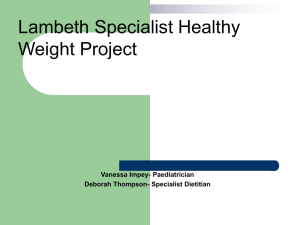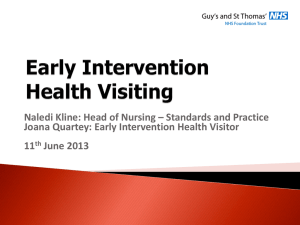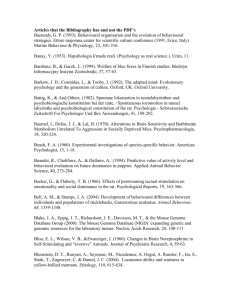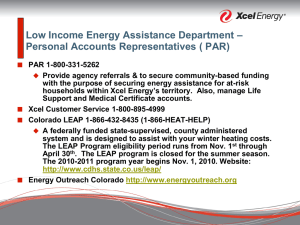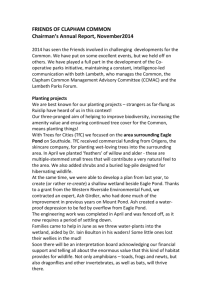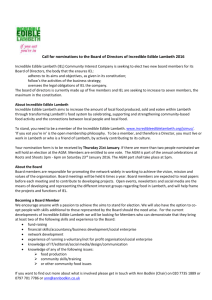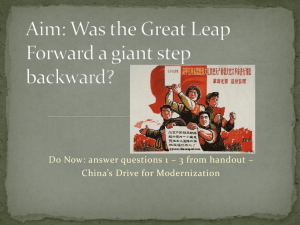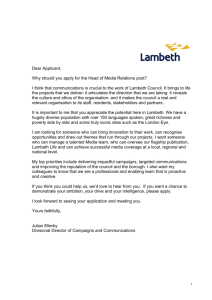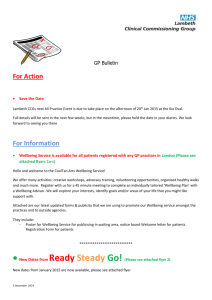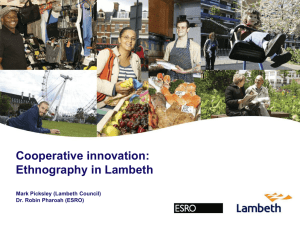Lambeth - Big Lottery Fund
advertisement
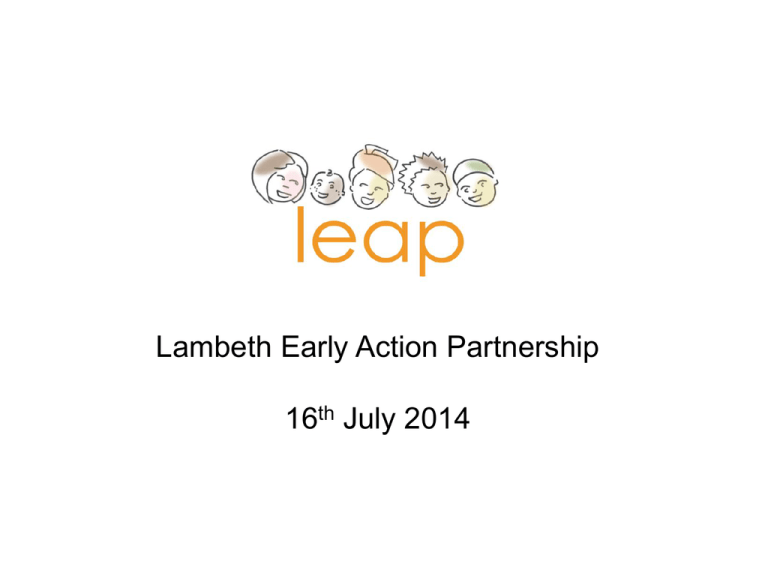
Lambeth Early Action Partnership 16th July 2014 Lambeth Early Action Partnership • • • • Our journey Our programme Our learning Our hopes and fears Our journey so far • The LEAP Partnership board -established during the development period. • Co- production as a guiding principle • Discovering assets and partnerships on our doorsteps • Inspiration and experience to be drawn from the Lambeth First Local Strategic Partnership , Young Lambeth Co-Op, innovative and integrated approaches to commissioning Community Based Leadership Multi Agency Strategic Partnerships Executive Decision Making Governance Community Engagement including: Children’s Centre Parent Forums Maternity Services Liaison Committee Young Lambeth Co-op Community Champions Breast Feeding Peer Supporters Health & Wellbeing Board Lambeth Safeguarding Children Board LEAP Partnership Board Community Appraisal Panel LEAP Core Project Team Families & Children’s Strategic Partnership Safer Lambeth Partnership Delivery Partners & Stakeholder Organisations VCS Forum Schools Forum Head Teachers Council Lambeth Council and Cabinet Children & Young People Scrutiny Lambeth Clinical Commissioning Group Governing Body LEAP Executive Board NCB Contract Board (Scrutiny) NCB Board of Trustees Our Programme Developing Our Vision • • • Parents as researchers ‘What works’ within Lambeth and elsewhere Outcome groups involving parents, practitioners, experts • • • • Dartington SRU matrix Review of 80 ‘interventions’ Fund-mapping Local data • • • • • ‘Lambeth will Impact of the AWS Parents’ views ‘Base Camp’ plugging the gaps in our knowledge Benchmarks for England and Europe ‘Theories of Change’ be the best place in the world for children to be born and grow up’ the leap rainbow A public health approach to improve health and wellbeing, and reduce inequalities I and my family will have better social and emotional development, communication and language, and will have a healthy diet and be well nourished. Expenditure on interventions Local Innovation, 35% Evidence Based, 44% Science Based, 21% 44% evidence based 21% science based 35% local innovation The first 18 months… •150 parents invited to attend an ante natal or post natal programme. •84 obese pregnant women will be invited to take part in the programme to reduce risk of complication in pregnancy and birth. •270 of our workforce will be trained to support parents experiencing relationship difficulties. •169 of our workforce will be trained in the Family Partnership Model to develop ‘helper’ qualities and skills to enable families to overcome difficulties. •234 parents with mild to moderate mental health problems will receive support. •150 parents, babies and children will receive support through the Watch, Wait, Wonder programme, •75 parents with EAL will complete a tailored LEAP course •120 babies and young children receive increased support around early language and literacy. •104 community champions recruited. •400 families will be offered support to alleviate the impact of living in overcrowded accommodation. •First time young parents in the area will be offered the Family Nurse Partnership programme. •New play areas on 4 estates and 4 one o clock clubs. •‘Way-finding’ will help families find services through highly visible and imaginative signage throughout the LEAP area, linking early years and health facilities to each other. •People who live and work in the LEAP area will be told about the programme and invited to participate. Our Learning • Deeper knowledge of the area, the inequalities that are not visible in aggregated data • The assets on our doorstep, adding up to a whole so much greater than its parts • Know about the evidence and practice that is most relevant to the local context • The relevance of evidence • The gaps in existing evidenced based practice • Potential for real social capital Our Hopes and fears….looking back after 10 years As we look back in 2024, we hope that: • The portfolio projects achieves the changes we expected • Services will have a more ecological approach • The impact is evidenced • Opportunities and outcomes have improved for over 10,000 children • We have succeeded in changing practice and how resource is invested But we fear: • Change will have been slower than planned • We’ll have suffered ‘programme envy’ from outside the LEAP area • We won’t have spent enough on evaluation • Professionals reverting back to their “comfort zone” in future
